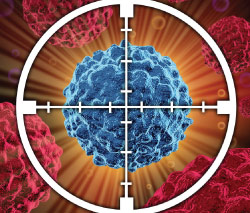Diet And Prevention Of Oral Cancer
Steps You Can Take To Reduce Your Risk
Dear Doctor,
What causes oral cancer and how can it be prevented? Does diet really help?

Dear Jim,
Tobacco and alcohol use are the most well-known risk factors for oral and pharyngeal (throat) cancer. Other important factors include diet and a strain of human papilloma virus (HPV 16), which is sexually transmitted. Genetic susceptibility can also play a role; most human diseases result from the interaction of your genes and environmental factors that may be chemical, physical, nutritional, or infectious, for example. But while we cannot control our genetic makeup, there are a number of lifestyle choices we can make in order to decrease the risk for oral cancer. Avoidance of tobacco, moderation in alcohol intake, avoiding risky sexual behavior, and eating a plant-based, whole-food diet can reduce the risk not only for oral cancer, but also for other common cancers, as well as chronic diseases such as heart disease.
The Link Between Diet And Cancer
A strong body of research over the past 50 years has established a link between diet and cancer, though the mechanisms for this connection are only partially understood. The process of carcinogenesis (“carcino” – cancer; “genesis” – origination) may be initiated by damage to DNA, the genetic material that contains crucial instructions that define each cell in the body and what it does. So how does cellular DNA become damaged? We are constantly exposed to environmental factors that can damage our DNA. The balance of harmful and beneficial exposures, and how they interact will determine if DNA will be damaged.
For example, a class of chemicals known as nitrosamines has been shown to be carcinogenic. Nitrosamines can be formed when nitrites used to preserve meat, such as bacon and ham, are ingested. Nitrosamines are also found in beer, fish and fish byproducts, cheese products, and other foods preserved with nitrite pickling salt.
DNA can also be damaged when it is exposed to “free radicals,” unstable molecules that are produced constantly during normal cellular function. Antioxidants protect the cells from damage caused by these free radicals. Your body therefore needs a good supply of antioxidants, and this is why dietary antioxidants are so important.
Investigators in epidemiologic studies have consistently found that a high intake of fruits and vegetables is protective against oral and throat cancer, as well as cancer occurring at other sites, including the esophagus (gullet), breast, prostate, lung, bladder and colon.
Phytonutrients (nutrients derived from plant foods) such as vitamins C and E have antioxidant properties and may prevent DNA damage by reducing exposure to free oxygen radicals. Adoption of a diet rich in plant foods, particularly fruits and vegetables, has been shown to increase the intake of these protective dietary factors. They include antioxidant vitamins; carotenoids (antioxidant compounds that give red and orange fruits and vegetables their color); lycopene (a carotenoid that makes tomatoes red); and fiber. At the same time, eating more plant foods will decrease your intake of pathogenic (disease-causing) dietary factors, including total fat, saturated fat, animal protein and nitrates.
It's important to note that dietary supplements, including vitamins and minerals, have not been shown to be effective substitutes for a diet high in fruits and vegetables. The protective benefits of antioxidants are most likely to come from ingesting them naturally in foods, not in pill form.
In answer to your specific question, investigators in epidemiologic studies have consistently found that a high intake of fruits vegetables reduce the risk for oral and throat cancer, as well as cancer occurring at other sites, including the esophagus (gullet), breast, prostate, lung, bladder and colon. According to the American Cancer Society, “evidence suggests that a third of the more than 500,000 cancer deaths that occur in the United States each year can be attributed to poor diet and physical inactivity.”
Other Important Steps Toward Prevention
As mentioned earlier, moderating alcohol intake and tobacco cessation are very positive steps you can take toward cancer prevention that your dentist or doctor can help you with. Understanding the risk of sexual transmission of HPV and reducing the likelihood of exposure to the virus is another important step. A whole-foods, plant-based diet, exercise and regular checkups with your dentist and doctor are important for maintaining good oral and general health. We all need to think about how our choices affect our health and I'm glad to see you're doing exactly that.



